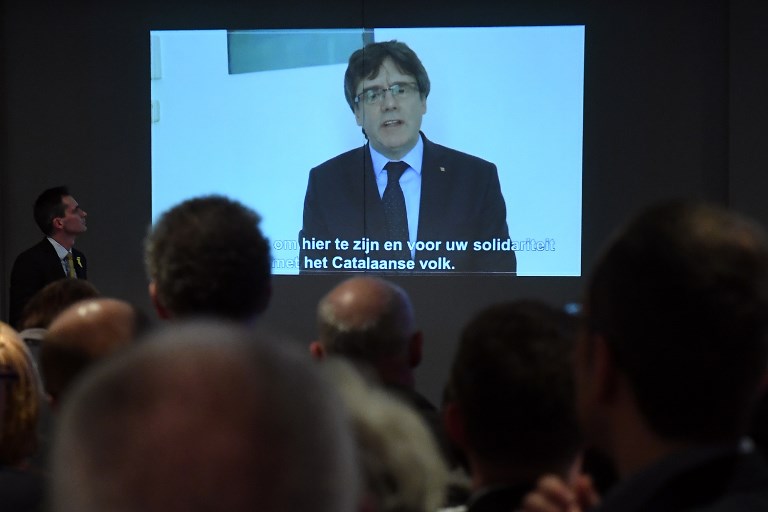
by Diego Urdaneta with Marianne Barriaux in Madrid
© Agence France-Presse
BARCELONA, Spain (AFP) — Divisions in Catalonia’s separatist bloc burst into the open Tuesday after the region’s parliamentary speaker postponed a crucial vote to reappoint ousted president Carles Puigdemont.
Roger Torrent, who like Puigdemont is pro-independence but hails from a different party, announced last minute he had delayed the parliamentary session to ensure it could later go ahead in an “effective” way after Spain’s Constitutional Court ruled against it.
Puigdemont, calling for unity, insisted Tuesday that only he could lead Catalonia.
“There is no other possible candidate, no other combination arithmetically possible,” in the regional parliament where separatists hold a majority of the seats, he said in a video posted on social media.
Torrent vowed that Puigdemont — who is in self-imposed exile in Belgium, but has been picked to lead Catalonia again after pro-independence parties won a majority in December elections — would be reinstated at a later date.
But while welcomed by Madrid, the decision drew angry protests from Puigdemont’s Together for Catalonia grouping and the CUP, another smaller, more radical separatist party.
We want “to hold the plenary session today, we’re here, we will be here all afternoon, we will be here as long as is necessary, there are people in the streets, we have the votes,” said Elsa Artadi, spokeswoman for Together for Catalonia.
As hundreds of protesters gathered outside the regional parliament in Barcelona, some of them wearing masks of Puigdemont’s face, CUP spokesman Carles Riera called for “a new period of mobilisation and civil disobedience”.
An attempt by some demonstrators to move closer to the assembly led to scuffles with police who pushed them back.
Puigdemont still candidate
Puigdemont, who left for Belgium shortly after he was sacked by Madrid over the Catalan parliament’s independence declaration in October, faces arrest if he returns to Spain for leading the secession bid in the deeply divided northeastern region.
Catalan lawmakers had been due to formally vote him into office on Tuesday afternoon.
But the central government lodged a complaint with the Constitutional Court last week, which ruled on Saturday that Puigdemont must be present at the assembly to be chosen as the region’s chief.
This would have been unlikely as he would be arrested on arrival in Spain and would have to ask the judge for permission to attend.
Announcing his decision to postpone the session, Torrent hit out at the ruling.
“The Spanish government and the Constitutional Court are trying to violate the rights of thousands of Catalans who went to the polls on December 21 and we won’t allow that,” he said.
“I won’t propose any other candidate,” he added, putting paid to speculation that separatists might drop Puigdemont and pick another candidate.
‘Fugitive living in Brussels’
The latest episode in the secession saga comes three months after the assembly’s failed declaration of independence on October 27, which triggered Spain’s worst political crisis in decades.
Prime Minister Mariano Rajoy moved to stop the crisis by imposing direct rule on the semi-autonomous region, sacking its government including Puigdemont, dissolving parliament and calling snap elections.
But in a major setback for the central government, separatist parties once again won a majority of 70 seats in the 135-seat parliament in the December polls.
Separatists argue that Puigdemont was given a democratic mandate to be reinstated at the polls. But Madrid remains fiercely opposed to his return to power.
“You can’t be a fugitive living in Brussels and expect to be elected president of a democratic institution,” Rajoy said Tuesday in an interview on Spanish television.
Separatist divisions
Torrent had risked criminal charges if he disobeyed the Constitutional Court by going ahead with the parliamentary session on Tuesday.
While two separatist parties criticised his decision to postpone it, deposed Catalan vice-president Oriol Junqueras, who like Torrent is from the ERC party and is in jail pending a probe into his role in the independence drive, welcomed the move.
Junqueras, who was elected as a lawmaker in December elections, thanked Torrent “for guaranteeing the defence of the rights of all democratically elected MPs”, in a message on Twitter.
Spain’s central government, meanwhile, said Torrent’s decision had avoided making a “mockery of our democracy”.
But it is unclear what will happen next.
A top lawmaker with ERC, Joan Tarda, said over the weekend it may be time to “sacrifice” Puigdemont although there is no obvious alternative.
But Torrent’s defence of the former Catalan leader makes this unlikely. A stalemate could eventually lead to new elections.
© Agence France-Presse






